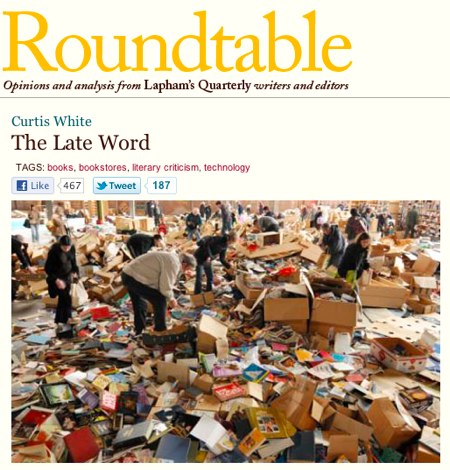Taste
Stacey Mason
Dept. of the End Of Books

Writing in Lapham’s Quartrerly, Chris White offers a thoughtful and educated approach to the perils that the publishing world faces—and more importantly, how these perils will affect the existing ideal of “literature” and the crowning of its next generation. He writes,
When we speak of literature, we should not imagine that we are speaking of some stable and enduring Platonic entity. The history of literature has always been about its highly mutable institutions, whether bookstores, publishers, schools of criticism, or, for the last half century, the mass media. In other words, literature has always been about the struggle over who would have the social authority to determine what would count as literature. Early on, this authority seems to have been the possession of men who had the privilege of owning printing presses and bookstores. In our own time, the most compelling claim to this authority comes either from the capacious bosom of Oprah Winfrey and her bathetic book club, or from the arid speculations of those Hollow Men on a publisher’s marketing staff.
White doesn’t subscribe to the “books are doomed” cliché, and he doesn’t idolize the small, independent bookstore; which he remembers as nothing more than a few disappointing tables of bestsellers surrounded by decorative bookshelves and served by employees who didn’t read. White disputes the idea of content and of the book as a platform, and likes to jab at “content providers” and “the techno-hip” to little purpose. But his concern lies in the idea of the bookseller as an usher of taste, seeing large bookstores, mass media, and internet culture as having the ability to control the institution of “literature.”
Criticism and recommendation are the points at which his arguments become contradictory. He focuses on the power of the publisher and seller to influence the idea of what is “literature” (and therefore what is “good”) and on the power of the internet to influence the masses, but doesn’t reconcile the competing ideals of literature as a high-brow endeavor beyond bathetic pop-culture recommendations.
Now, through word of mouth and blog site recommendations, some will find that book of poetry, although those folk will be, I suspect, mostly poets themselves, reduced now to a rarified species of hobbyist no greater in number than those enthusiasts who attend quilting fairs. (In all honesty, this is already a done deal.) But the population of people interested in finding that transforming book will become ever smaller. Literature requires a culture, a book culture, and the ebook and the web, for all of their wizardry, will forever be solipsistic.
Beyond this contraction, White has painted himself into a corner with the idea that taste is an institutional product. Though he doesn’t acknowledge it directly, academia is responsible for the very idea of literature that White wants to protect. The intellectual elite shape literature into anthologies, archives, theories, and syllabi, naturally preserving the notion of “literature” and assigning merit to work they have collected while damning rejected work to be dismissed or—worse—forgotten.
So at the end of the day, how do we find the good work? Everything relies on thoughtful review. We need more well-written, thoughtful criticism. And in the eLit world, first we need more writing.
